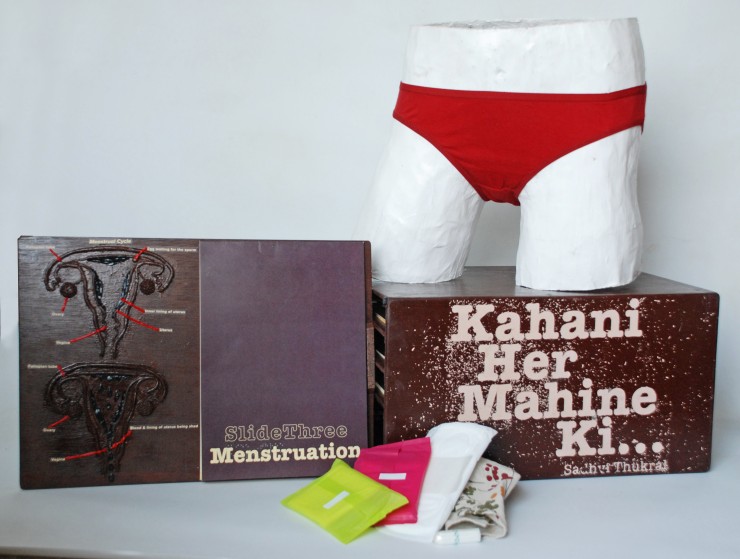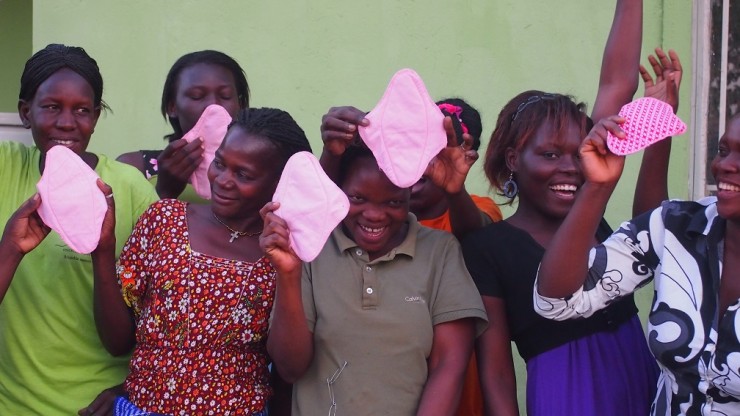These two concurrent sessions address the menstrual-related challenges of women with disabilities, menstrual hygiene taboos and practices around the world, and the concept of gynaecological self-help at the 21st Biennial Conference of the Society for Menstrual Cycle Research at The Center for Women’s Health and Human Rights, June 4-6, 2015, Suffolk University, Boston.
Menstrual Management, Friday, June 5th:
Women with Spinal Cord Injuries Talk about Menopause
Heather Dillaway, Wayne State University
Using data from interviews with 20 women with spinal cord injury, I illustrate how disabled women may think about and experience menopause. Overall, interviewees think positively about menopause as a release from the hassles of menstruation, but face unique experiences when dealing with perimenopausal symptoms. I also discuss their concerns about aging.
 “Kahani Her Mahine Ki” – A Menstruation Kit for the visually impaired women
“Kahani Her Mahine Ki” – A Menstruation Kit for the visually impaired women
Sadhvi Thukral, National Institute of Design
“I am constantly worried that my dress will stain during my period, I cannot see.”
“I will never be able to tell the colour of my discharge during menstruation or when I need to change my cloth. To be safe, I change every few hours.”
These are unique anxieties of visually impaired young women.
A large gap exists in the area of “Communication for Menstruation” for the visually impaired. This design degree project was an attempt to fill this gap by developing a product for menstruation that would meet the needs of visually impaired girls and women.
The kit “Kahani Her Mahine Ki” (The Same Story Every Month) covers the subject of menstruation and how to manage during periods and has the following features:
1. Tactile diagrams and material in the form of Information Slates, with labels of the different body parts. Each slate has text for the sighted and Braille for the visually impaired. 2. A life size human body model for demonstration.
What they do, what we do, what I do: A critical review of five contemporary international surveys of menstrual management practices and technologies. How can these surveys inform Western practice? What areas remain to be surveyed?
Susannah Clemence, Independent researcher
This critical review compares the catalogues of contemporary menstrual management techniques from around the World, presented in Sommer et al (2013), House et al (2012), Kjellen et al (2012), Bharadwai and Patkar (2004) and Finley’s (1995-2015) Museum of Menstruation.
The purpose is to test how well-documented are contemporary practices across the World, and what areas remain yet unrecorded. The rationale is that diverse technologies and conduct, with their implicit beliefs and attitudes, grant us reference points from which to examine, critique and improve our own practices.
The review shows that there are large gaps in documented knowledge. Furthermore, other than the Museum of Menstruation, existing surveys tend to be rooted in development agendas of Western origin and tend to a deficit perspective of non-Western practices.
Menstrual Hygiene, Saturday, June 6th
 A Vicious Cycle of Silence: The perpetuation of the menstrual hygiene ‘taboo’ and the implications for the realisation of the human rights of women and girls
A Vicious Cycle of Silence: The perpetuation of the menstrual hygiene ‘taboo’ and the implications for the realisation of the human rights of women and girls
Emily Wilson-Smith, Kampala International University & Robyn Boosey, University of Bristol
Despite the impact of poor menstrual hygiene on the rights of women and girls it has remained largely neglected by International stakeholders. A document analysis of the core international human rights treaties and relevant human rights body reports found an overwhelming silence and an analysis of the existing references revealed an inadequate framework for addressing menstrual hygiene.
Improving Menstrual Health and Hygiene in India: Another critical path way for women emancipation
K Yadagiri, Centre for Economic and Social Studies,UNICEF Division for Child Studies
Gynecological Self-Help Isn’t Just a Good Feeling – What we learned when we systematically studied our own menstrual cycles – and how you can learn MORE now!
Kathy Hodge, Feminist Women’s Health Center
In 1975, nine members of the Feminist Women’s Health Center collective met daily for over a month, recording changes in our vaginas and cervixes and their secretions, for PAP and ferning smears, charting moods and basal body temperature. We raised questions, some of which remain open and ripe for future woman-controlled research.
Menstrual Hygiene Management practices in Slums: It’s impacts on the Women and Adolescent Girl’s Health – A Case study of Greater Hyderabad Municipal Corporation Slums, Telangana State, INDIA
Venu Madhav Sharma, Centre for Economic and Social Studies
Media Release and Registration for the SMCR Boston Conference on Menstrual Health and Reproductive Justice: Human Rights Across the Lifespan.

